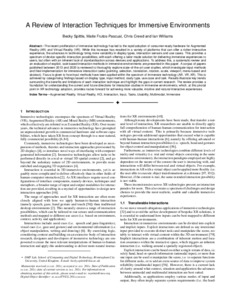Spittle, Becky and Frutos-Pascual, Maite and Creed, Chris and Williams, Ian
(2022)
A Review of Interaction Techniques for Immersive Environments.
IEEE Transactions on Visualization and Computer Graphics.
ISSN 1077-2626
![[img]](/13376/1.hassmallThumbnailVersion/A_Review_of_Interaction_Techniques_for_Immersive_Environments.pdf)  Preview |
|
Text
A_Review_of_Interaction_Techniques_for_Immersive_Environments.pdf
- Accepted Version
Download (701kB)
|
Abstract
The recent proliferation of immersive technology has led to the rapid adoption of consumer-ready hardware for Augmented Reality (AR) and Virtual Reality (VR). While this increase has resulted in a variety of platforms that can offer a richer interactive experience, the advances in technology bring more variability in display types, interaction sensors and use cases. This provides a spectrum of device-specific interaction possibilities, with each offering a tailor-made solution for delivering immersive experiences to users, but often with an inherent lack of standardisation across devices and applications. To address this, a systematic review and an evaluation of explicit, task-based interaction methods in immersive environments are presented in this paper. A corpus of papers published between 2013 and 2020 is reviewed to thoroughly explore state-of-the-art user studies, which investigate input methods and their implementation for immersive interaction tasks (pointing, selection, translation, rotation, scale, viewport, menu-based and abstract). Focus is given to how input methods have been applied within the spectrum of immersive technology (AR, VR, XR). This is achieved by categorising findings based on display type, input method, study type, use case and task. Results illustrate key trends surrounding the benefits and limitations of each interaction technique and highlight the gaps in current research. The review provides a foundation for understanding the current and future directions for interaction studies in immersive environments, which, at this pivotal point in XR technology adoption, provides routes forward for achieving more valuable, intuitive and natural interactive experiences.
Actions (login required)
 |
View Item |

 Tools
Tools Tools
Tools